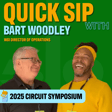
OAWB - AT STEP OFF with a California Drum Major Champion Roundtable
Bonus Content At Step Off
Join us with our new Bonus Content. On A Water Break At Step Off. Host Jack Groudreau dives into all things parades from coast to coast and around the world. This episode Jack hosts a roundtable of Drum Majors who have all won the California State Championships.
Guests:
Chance McDonald - @drummajor_2018
Kaden cho - @kaden.cho
Zac Shi - @zac.shi
Keegan Mccoy - @keegiez
All from the @Americandmcorps
Listen to the main episode to keep up on everything going on in the marching arts with our hosts:
Jackie Brown - @spintronixguard
Stephen McCarrick - @stephenmccarick
Cindy Barry - @leandermomma
Nicole Younger - @o2bnpjs & @thecookoutcg
Trevor Bailey - @t_pain151
Trish O’Shea - @trishdish1002
Beth Beccone - @bether7189
Chris Rutt - @wildhornbrass1
Cynthia Bernard - @cynthiabern
Ashlee Amos - @famousamossss_
Theo Harrison - @harrisontheo07
Stephanie Click - @stephanieclick
Whitney Stone - @dancerwhit
Justin Surface - @J_dex07
Ashley Tran - @itsashleytran
Jack Goudreau - @goudreau_
Ricardo Robinson-Shinall - @ricardorrobinson
Callie Quire - @cnquire
Austin Hall - @Austin_hall10
Jose Montes - @joeymontes57
Music provided by leydamusic.com Follow him @josh.leyda
Avatars provided by @tch.makes.art
#marchingband #colorguard #dci #podcast #onawaterbreak #parade #drummajor



















